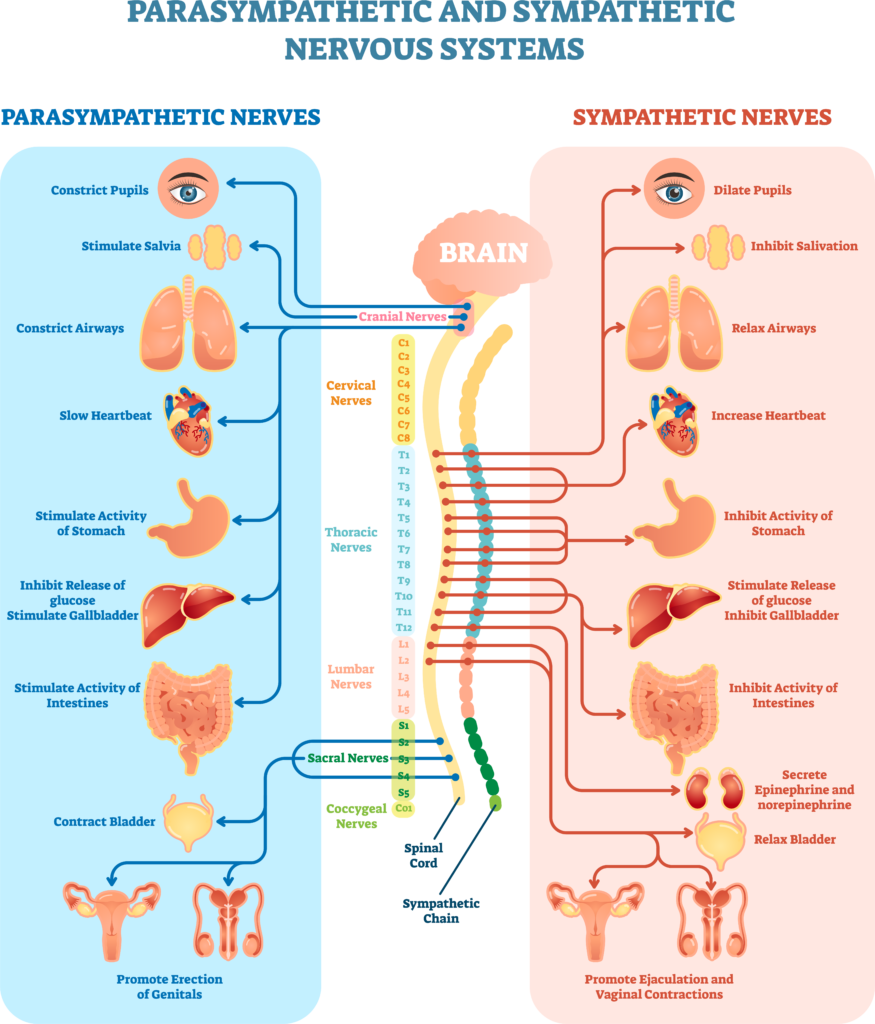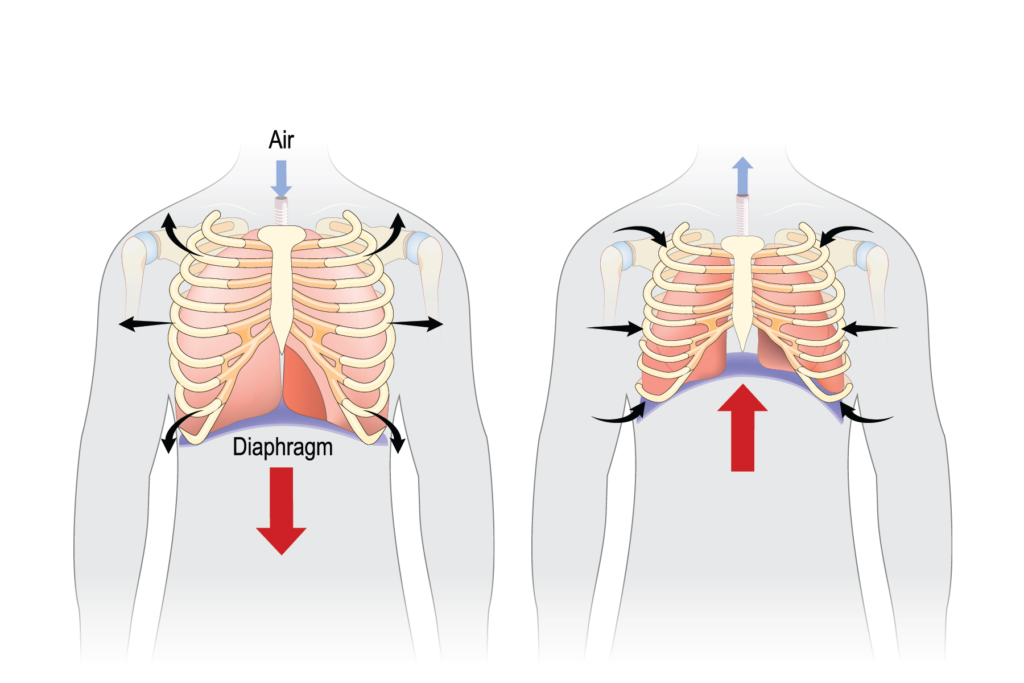When I sat down to write this blog, I wondered, “Does knowing how your nervous system works really make a difference for managing stress?”
With all of the info in blogs and magazine articles with titles like: “What’s burnout and how to deal with it” and “10 signs you’re overwhelmed and how to fix it,” why do we still struggle with stress?
The answer is much more complicated than knowing your nervous system. I’m not going to pretend that 1041 words explaining your stress response is going to magically whisk away stress. Not when your nervous system is continuously responding to stimulus in your environment and the world around you is constantly changing and stressors pile up.
What may help is a peek into the inner workings of the nervous system and what you can do to support it to build stress resilience.
So, does knowing how your nervous system works really make a difference for managing stress?
Maybe you thought, “Hmmm, I don’t know.”
Think about it this way: Does knowing how a light turns on when you flick the switch really make a difference for illuminating a room?
Probably not, until the light doesn’t work.
When your bedroom doesn’t brighten, what do you do? Check the lightbulb first, followed by the circuit breaker, whether or not you paid the power bill, and finally if there are outages in the area. Support your nervous system the same way.
Your nervous system is the electricity of your body. It’s organized within the body in two branches: the somatic and autonomic systems. Soma means body. Your somatic nervous system tells your skeletal muscles how to roll and throw a snowball and sends sensory info back to your brain that your hands are cold. Autonomic means involuntary. Your autonomic nerves keeps your internal organs chugging along so you don’t have to think about them while you’re reading this.
Your autonomic nervous system is further divided into two branches: the sympathetic and parasympathetic systems. You may know them as “fight or flight” and “rest and digest.” To mix my analogies, your sympathetic nervous system functions like a gas pedal in a car; it gives your body a burst of energy to respond to perceived dangers. Your parasympathetic nervous system acts like a brake. It slows your breath down, relaxes your muscles, and reduces blood pressure to calm your body down after danger has passed.

Like electricity, nerves can only be turned on. And yes, yes, I know when you turn a light switch off your space darkens, which seems like electricity works both ways. But, all you’re doing is interrupting the power circuit. It’s the same with your nerves. Even when they’re “off” the potential energy is still there, but an impulse hasn’t activated it. Nerves and electricity only light up when they’re turned on.
When your “fight or flight” response is turned on more than “rest and digest,” the cascade of accompanying hormonal and physiological responses can take a toll on your body and mind over time. Research suggests that chronic stress contributes to high blood pressure, promotes the build up of artery-clogging deposits, and causes brain changes that may contribute to anxiety, depression, and addiction. It can also alter how you eat and sleep.
After a while, it may feel like relaxation is out of reach. But, you can redirect power to your rest and digest response the same way you’d remedy a glitchy light.
Swap out the light bulb = take a deep breath.
Your diaphragm, or breathing muscle, is a domed shaped muscle that lies at the bottom of the lungs. It’s regulated by both somatic and autonomic nerves, which means you can breathe while thinking about it or not. Because the diaphragm is under both conscious and unconscious control, it is opportunistically positioned to consciously affect the autonomic nervous system through regulated breath practices.

When you breathe in using your diaphragm, the contraction plunges the muscle toward the abdomen, which creates a vacuum-like effect to draw air into the lungs. At the same time, your diaphragm presses down on your abdominal organs, which is what you feel balloon out in your abdomen. This way of breathing is the most calming and sedating. To do it, imagine a deflated balloon in your abdomen, when you breathe in, see it inflating in all directions. It may take some practice at first, but the easiest way to change your breathing is to become more aware of your breathing.
Check your circuit breaker = do some restorative movement.
Holding a fixed position, like hunching over your desk racing to meet your project deadline, creates rigidity in your tissues due to the stress response. Moving your muscles in opposing directions than they’re normally in restores the structural imbalances that lead to tension. Movements like walking, myofascial release, and yoga will mobilize stagnant body parts and (bonus!) boost your feel good neurotransmitters.
Pay your power bill = eat and sleep well.
Nerve cells need specific nutrients like potassium, sodium, B vitamins, vitamin E, and calcium to fuel your power grid. Eating a variety of whole foods is like paying your power bill to keep the electricity on. The same goes for sleep. Getting some zzz’s shifts your nervous system out of “fight or flight,” repairs muscles, organs, and cells, and floods your bloodstream with immune strengthening biochemicals.
Check for power outages = mind your mental health.
As you witness after each natural disaster, the electrical grids meant to provide life sustaining power often fail. After each hurricane or blizzard, customers compel power companies and regulatory bodies to shore up the system to withstand stress. And while that may not happen for various political reasons, you can fortify your own internal power grid. A nervous system power outage or surge, for example, may be an unresolved trauma response or panic attack. Reach out to a mental health professional for support, coping mechanisms, and self-regulation techniques.
When coping with stress it’s important to remember that your nervous system responds based on your perception and past experience. Shifting your perception of how your nervous system works – like to how you’d troubleshoot a faulty light – may produce real changes to your biological response to stress. Maybe systematically soothing yourself will strengthen your stress resilience.







0 Comments